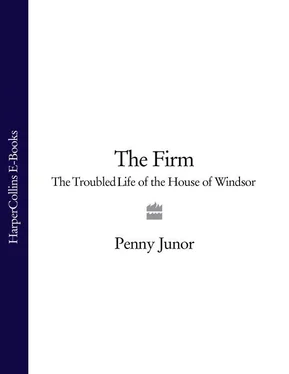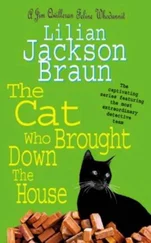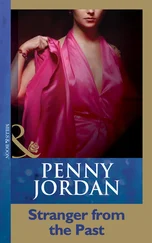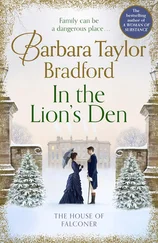Four years later the Prince fell for another girl, Davina Sheffield, who could have been the soulmate he was searching for. She seemed ideal in so many ways, and they appeared to be very much in love, but she already had a boyfriend when Charles met her, an Old Harrovian and powerboat racer called James Beard. Davina initially rebuffed invitations to have dinner with the Prince, but he was so persistent that she eventually succumbed and the boyfriend soon fell by the wayside. He was subsequently conned into talking about his relationship with Davina by what turned out to be a Sunday tabloid reporter and the story of their affair, complete with photographs of their ‘love nest’, made headline news. It killed the relationship stone dead.
That was not the only time a girlfriend’s past was raked over, but the strong message girls took from all of this was that, unless you wanted the third degree from the tabloids, Prince Charles was not the man to date. By the same token, if your public profile needed a bit of a hike, in the case of actresses and starlets, he was your man.
Unsurprisingly Charles became despondent about ever finding the perfect girl and sought refuge with a number of married women, one of whom was Camilla Parker Bowles. Meanwhile, the press continued to link him romantically with just about every eligible girl he had ever shaken hands with, and went so far as to announce his engagement to one, Princess Marie Astrid of Luxembourg, whom he had never even met. The pressure was almost intolerable and he began to think that no girl in her right mind would ever want to be involved with him, far less marry into the House of Windsor. So when he met Diana in 1979, and found her to be so fresh, funny and delightful, as well as suitably aristocratic, and at just seventeen, suitably innocent, he began thinking of her as a potential wife.
They had first met two years before when Diana was still a schoolgirl and, in his eyes, jolly and fun, but nothing more than the little sister of his current girlfriend, Lady Sarah Spencer. Two years later, when that relationship had ended, they met again and although still very young in some respects, she had surprising maturity in others and clearly seemed to adore him. They had a number of casual meetings, never dates, always with others; and then sitting on a hay bale in the summer of 1980 she had touched him deeply. They were at a barbecue near Petworth, in Sussex, and he mentioned the murder of Mountbatten. She either had compassion that was way beyond her years or knew precisely which button to press. She said how sad he had looked at the funeral in Westminster Abbey; how she had sensed his loneliness and his need for someone to care for him.
Later that summer she went to stay with her eldest sister, Jane, married to Robert Fellowes, the Queen’s Private Secretary, at their cottage on the Balmoral estate; his infatuation deepened and everyone in the household fell in love with her. That autumn he invited her to a house party at Balmoral, after the Queen had left, to see what his friends thought. They were bowled over. As Patty Palmer-Tomkinson said to Jonathan Dimbleby:
We went stalking together, we got hot, we got tired, she fell into a bog, she got covered in mud, laughed her head off, got puce in the face, hair glued to her forehead because it was pouring with rain … she was a sort of wonderful English schoolgirl who was game for anything, naturally young but sweet and clearly determined and enthusiastic about him, very much wanted him.
Imagine his surprise, therefore, when after their engagement she seemed suddenly to hate everything he had thought she loved. He was quite at a loss to understand the change in Diana and thought it must be his fault in some way; that the prospect of marrying him was all too ghastly. And yet he spoke to no one about his anxieties; and when concerned friends tried to talk to him, he refused to listen. Pulling out would have been unimaginable: the humiliation, the hurt, the headlines, the castigation; but in retrospect, it would have been infinitely less painful and less damaging to everyone involved, including the monarchy, than going through with a wedding that he knew was a mistake. At the very least he should have discussed it. As one relation says, ‘In his position he bloody well should have spoken to people because he had to think of the constitutional side as well as the private side. He had chosen Diana with both sides in mind, but equally he needed to think of the consequences for both if it was going to go wrong.’
The trouble is that the Prince of Wales is fundamentally a weak man, and that is what has so incensed the Duke of Edinburgh over the years. He wanted a son in his own image – a tough, abrasive, plain-talking, unemotional man’s man – but those qualities bypassed his first son and settled instead on his daughter. Charles has a generous heart, he cares hugely about the underdog, because, for all his palatial living, he is one, he identifies. He wants passionately to make the world a better place, to stop people feeling hopeless and helpless, to stop modernizers from destroying our heritage, chemicals from destroying our environment, ignorance and greed from destroying our planet, red tape from destroying our lives. He is admirable in so many ways, but he has never been a strong character and has never been able to cope with confrontation. Blisteringly angry at times, certainly, demanding, yes, and on the sporting field no one could question his courage, but he has never been brave when it comes to taking tough decisions. He gets others to do it for him. Perhaps it is because he has always been surrounded by strong women: his grandmother, his mother, his sister – even his nanny. Helen Lightbody was such a terrifying woman that the Queen kept out of the nursery while she was in charge. By the time the Queen had the two younger children Helen Lightbody had gone and Mabel Anderson, her deputy and a much easier character, was in charge, and she and the Queen were good friends and brought the children up together. As a result the Queen had much more contact with Andrew and Edward than she ever had with Charles and Anne, and is still infinitely closer to them today.
In marrying Diana, for all her emotional turmoil and frailty Charles had found himself with another strong, determined woman. He didn’t understand her rages – one day during their honeymoon, when they were staying at Craigowan Lodge, a small house on the Balmoral estate, she lost her temper and went for him with a knife which she then used to cut herself, leaving blood everywhere. That night as he knelt down to say his prayers – as he regularly does – Diana hit him over the head with the family bible. He has never been to the house since. He just couldn’t fathom the emotional rollercoaster, the demands, the insecurities; he couldn’t cope, needed others to help, which of course infuriated her more. Michael Colborne was the first of a long string of members of the Prince’s staff who had to mediate with Diana while Charles backed away. Even during the honeymoon he was summoned to Balmoral to talk to Diana because she was so bitterly unhappy. She was already caught in the grips of an eating disorder, bored by the countryside, made miserable by the rain and baffled by the Prince’s desire to spend his days shooting and fishing. And what was he doing while Colborne spent more than seven hours with Diana while she raged, cried, brooded in silence, ranted and kicked the furniture by turns? He was out stalking with his friends.
That night both men were taking the train back to London; the Prince had an engagement in the south, Diana was staying at Balmoral. As Colborne waited in the dark by the car, a brand-new Range Rover, he could hear a fearsome row going on inside. Suddenly the door flew open and Charles shouted ‘Michael’ and hurled something at him, which by the grace of God he caught before it was lost in the gravel. It was Diana’s wedding ring; she had lost so much weight it needed to be made smaller. The Prince was in a black rage all the way to the train; the new car wasn’t quite as he had specified and so he took it out on Colborne, calling him every name under the sun. Exhausted and defeated by his day with Diana, Colborne simply stared out of the window and let the abuse wash over him. Once on the train, the Prince summoned him. Colborne had just ordered himself a triple gin and was in no hurry to respond. The Prince offered him another. ‘Tonight, Michael,’ he said, ‘you displayed the best traditions of the silent service. You didn’t say a word.’
Читать дальше












